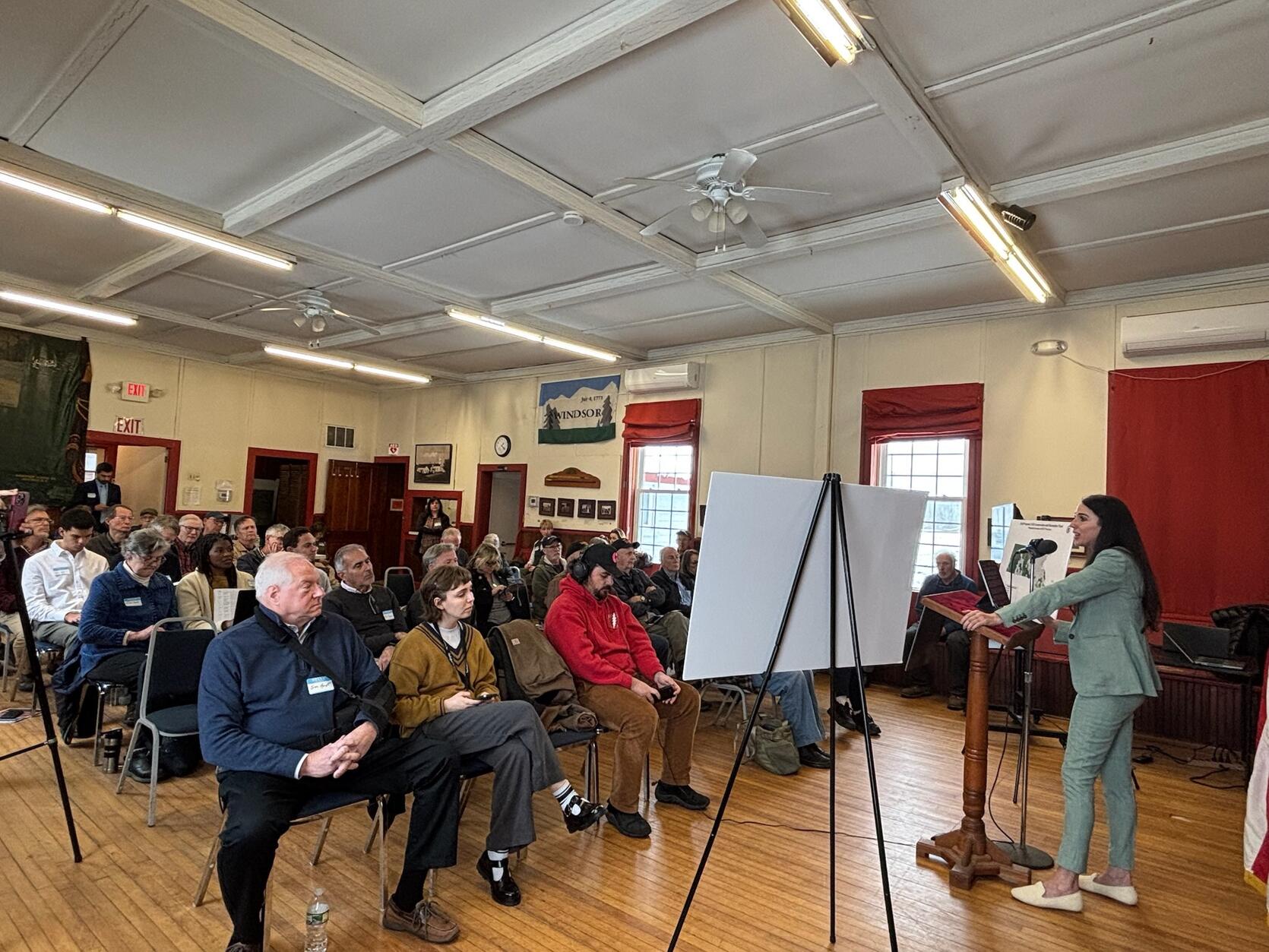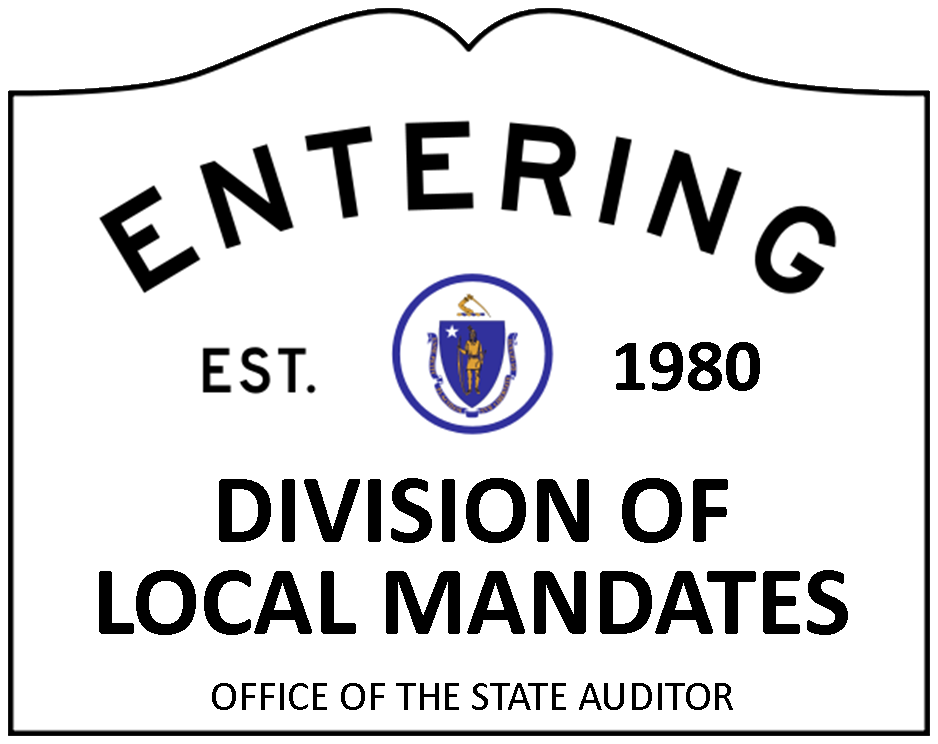- Office of the State Auditor
- Division of Local Mandates
Media Contact
Andrew Carden, Director of Operations

WINDSOR — Today, State Auditor Diana DiZoglio joined local officials from Western Massachusetts and representatives from the Woodlands Partnership at Windsor Town Hall to discuss key recommendations from the recent Division of Local Mandates (DLM) report, “Pursuing Equitable State-Owned Land Reimbursements for Municipalities.”
The state’s payment in lieu of taxes (PILOT) program plays a crucial role in supporting essential municipal services, allocating reimbursements to 297 cities and towns that collectively host over 461,000 acres of tax-exempt, state-owned land. An overwhelming majority (92%) of this land is protected (primarily used for conservation and/or recreation with significant limitations on development) and showcases some of the most scenic landscapes in the Commonwealth, from Salisbury Beach to Mount Greylock.
The PILOT formula results in cities and towns receiving widely varied reimbursements. In FY 2024, reimbursements ranged from $5 to $28,546 per acre. Municipalities hosting large swaths of protected state-owned land have received some of the lowest PILOT reimbursements per acre. Of the 129 municipalities holding over 1,000 acres, 97 have PILOT reimbursements below the state median per acre ($127 as of FY 2024). Eighty (80) of these municipalities are located in central and western Massachusetts.
Virtually all municipalities with over one-third of their land as state-owned are in western Massachusetts with PILOT reimbursements below $50 per acre. Local leaders from this region point to large protected state-owned land holdings and ongoing state acquisitions as challenges to generating tax revenues and funding local services.
To address these issues, the report makes meaningful recommendations to address the inequities and challenges in the current formula. Its comprehensive analysis recognizes the imbalance of PILOT payments, where an acre in one town could fetch a sizably larger reimbursement than an acre in another town. This imbalance is based on the perceived value of that land, with protected land often being seen as less valuable.
Accordingly, the report recommends the establishment of a base dollar amount, establishing a floor for per-acre reimbursement. It goes further by laying out what the cost and benefits would be for different base amounts.
- Implementing a floor of $50 per acre would provide supplemental funding to 75 cities and towns representing 1 in 4 PILOT communities receiving the lowest reimbursements per acre, many of which are playing a pivotal role in helping the Commonwealth meet environmental, recreational and overall public health goals by hosting protected land.
- Establishing a floor payment would recognize those contributions while helping to provide state resources to financially strapped communities.
The report also recommends updating the formula to ensure increased PILOT funding by at least the average percentage change in state-owned land values to protect municipalities experiencing lower land value growth from losing funding to municipalities with higher land value growth.
- This recommendation recognizes that level-funding the PILOT program does not keep up with land values and thus further creates losers – especially for towns with less wiggle room in their municipal budgets.
- This will allow municipalities to anticipate future reimbursements when setting their annual budgets.
- With local budgets heavily reliant on property taxes, many smaller communities feel the real pain in services with even mild reductions at the state level. Hold-harmless would create predictability in the building of budgets, adding to stability and demonstrating the partnership that local communities deserve from the Commonwealth.
Finally, the report recommends the adoption of a hold-harmless provision to prevent decreases in PILOT reimbursements to individual cities and towns in the event funding for the program is not adjusted to reflect increases in state-owned land values.
“No more forgotten communities,” said Auditor DiZoglio. “Every community deserves a seat at the table. Western and Central Mass residents pay taxes just like everyone else — they deserve equitable access to state resources and opportunities. Our PILOT reform plan seeks to bring dignity to every corner of Massachusetts. My office’s Division of Local Mandates dove into this issue, collecting data and providing recommendations for how our more rural communities can be reimbursed for the state-owned land located in their communities. Every dollar counts and this comprehensive report will serve as a tool for advocates and lawmakers as we seek policy changes to help ensure a more equitable distribution of PILOT payments. This report demonstrates how incremental increases have the potential to make a big impact for our rural communities. Further, it recognizes that unpredictable appropriations from year to year can have outsized effects on financially strapped cities and towns. Thank you to the Woodlands Partnership and other local officials for gathering today to support these much-needed reforms.”
“Windsor has 30% of its land owned by the Commonwealth,” said Windsor Select Board member Chris Cozzaglio. “That’s land that’s taken off the tax rolls for our municipality. A more equitable formula would have a huge impact on our bottom line.”
“This report is an analytical tool that lays out, in stark terms, the disparities between eastern and western Massachusetts,” said Peru Select Board member Sam Haupt. “It presents an opportunity to educate policymakers, as well as other communities, so that impactful changes can be made.”
The Woodlands Partnership of Northwest Massachusetts is a unique local effort to both conserve forests and support the region’s rural, land-based economy across the Northern Berkshire Mountains, hilltowns, and riverside villages of northwestern Massachusetts. Representing 20 towns, Woodlands Partnership was eager to bring attention to policy recommendations for a PILOT system that they have long advocated to reform.
“The Commonwealth of Massachusetts owns 64% of all permanently conserved open space in the Woodlands Partnership region,” said Kate Conlin, Woodlands Partnership Coordinator. “These lands offset the environmental impacts of developed areas in other parts of the state, providing clean air and water, hosting natural spaces for recreational purposes, and sustaining biodiversity.”
Auditor DiZoglio encourages report readers to review the interactive state-owned land dashboard, where dashboard users can explore how the report’s findings and recommendations impact individual communities and regions.
To watch the full press conference, visit https://www.facebook.com/AuditorMA/videos/1021379955991185.
###
